Demolition Contractors Upton
Find top Structure Demolition in Upton
Receive 3 FREE Building Demolition quotes for your project today! Compare profiles, reviews, accreditations, portfolio, etc... and choose the best deal.
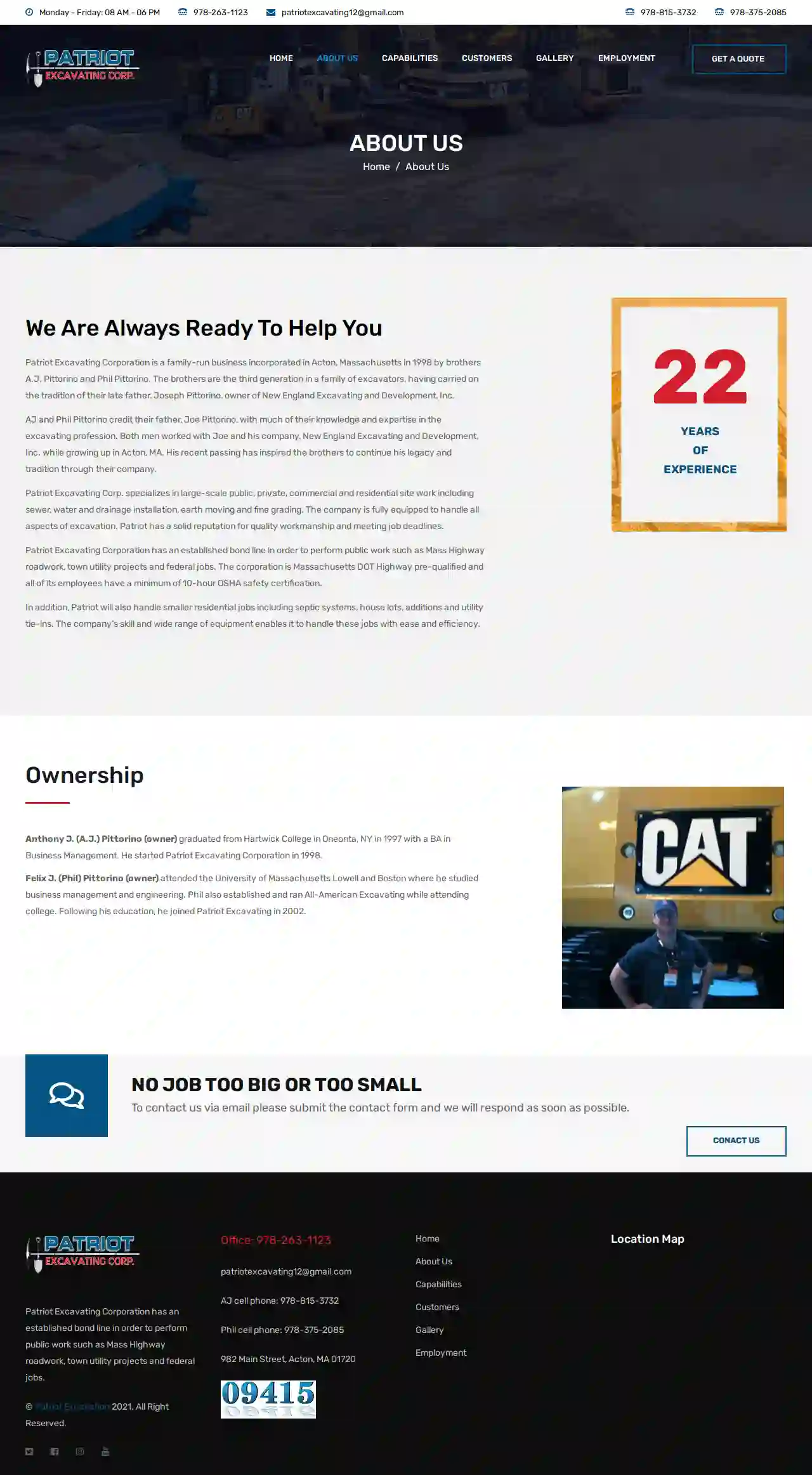
Patriot Excavation
982 Main Street, Acton, 01720, USAbout Us Patriot Excavating Corporation is a family-run business incorporated in Acton, Massachusetts in 1998 by brothers A.J. Pittorino and Phil Pittorino. They are the third generation in a family of excavators, carrying on the tradition of their late father, Joseph Pittorino, owner of New England Excavating and Development, Inc. A.J. and Phil Pittorino credit their father, Joe Pittorino, with much of their knowledge and expertise in the excavating profession. Both men worked with Joe and his company, New England Excavating and Development, Inc. while growing up in Acton, MA. His recent passing has inspired the brothers to continue his legacy and tradition through their company. Our Services Patriot Excavating Corp. specializes in large-scale public, private, commercial and residential site work including sewer, water and drainage installation, earth moving and fine grading. The company is fully equipped to handle all aspects of excavation. Patriot has a solid reputation for quality workmanship and meeting job deadlines. Patriot Excavating Corporation has an established bond line in order to perform public work such as Mass Highway roadwork, town utility projects and federal jobs. The corporation is Massachusetts DOT Highway pre-qualified and all of its employees have a minimum of 10-hour OSHA safety certification. In addition, Patriot will also handle smaller residential jobs including septic systems, house lots, additions and utility tie-ins. The company’s skill and wide range of equipment enables it to handle these jobs with ease and efficiency. Our Team Anthony J. (A.J.) Pittorino (owner) graduated from Hartwick College in Oneonta, NY in 1997 with a BA in Business Management. He started Patriot Excavating Corporation in 1998. Felix J. (Phil) Pittorino (owner) attended the University of Massachusetts Lowell and Boston where he studied business management and engineering. Phil also established and ran All-American Excavating while attending college. Following his education, he joined Patriot Excavating in 2002.
- Services
- Why Us?
- Our Team
- Gallery
Get Quote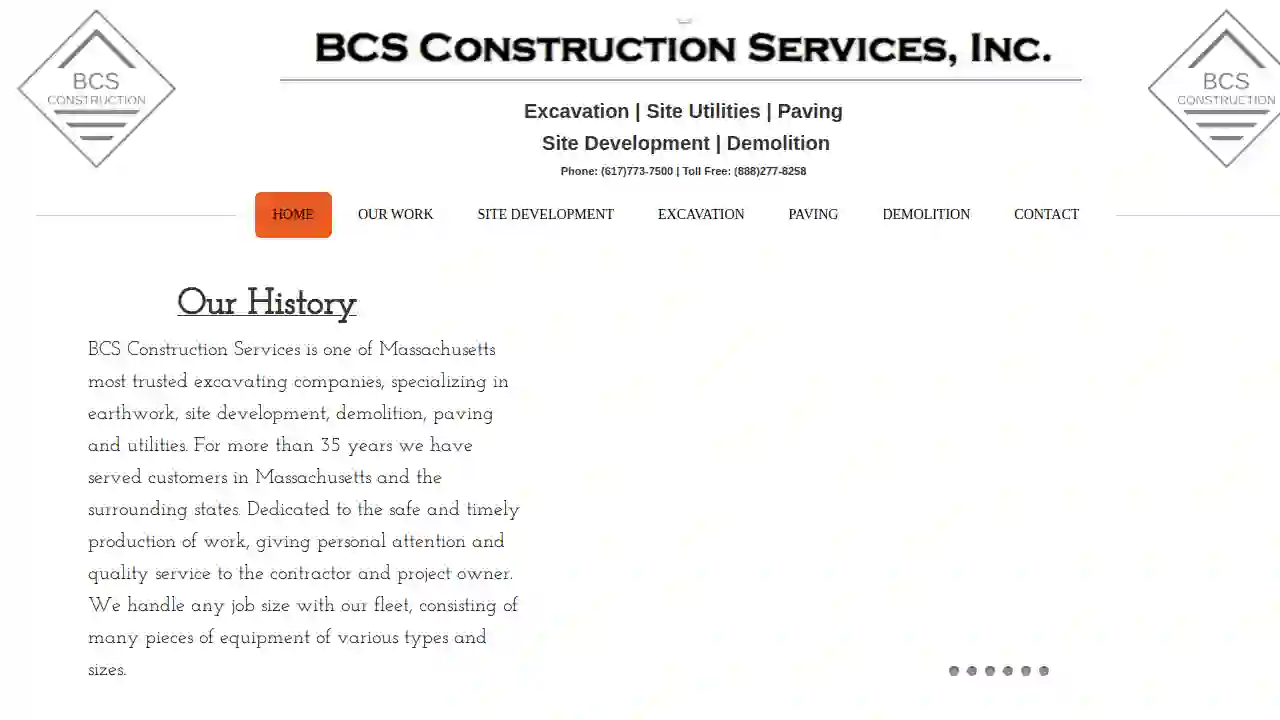
Boston Contracting Services
859 Willard Street, Suite 400, Quincy, 02169, USBCS Construction Services is a trusted excavating company in Massachusetts, specializing in earthwork, site development, demolition, paving, and utilities. For over 35 years, we've served customers in Massachusetts and surrounding states. We're dedicated to safe and timely work, providing personal attention and quality service to contractors and project owners. We handle any job size with our fleet of diverse equipment. Our Core Focus We specialize in a wide range of services, including: Roads Parking Lots Grading and Compacting Industrial Manhole & Catch Basins Municipal Paving Car Dealerships Demolition Our Services We offer a comprehensive range of services, including: Site Development Excavation Paving Demolition Utilities Licenses & Certifications BCS Construction Services holds various construction and engineering licenses in cities and towns throughout Massachusetts. We are licensed to perform all municipal and commercial work, and we hold licenses to operate interstate when necessary. Our team also holds various safety licenses from OSHA. Insurance & Bonding BCS Construction Services is capable of meeting most insurance requirements for mid to large-size commercial jobs. We also hold various bonds with cities and towns throughout Massachusetts. Other Services BCS Construction Services has provided expert witness testimony to assist in various construction and real estate-related activities. Please contact us directly if you are interested in this service.
- Services
- Why Us?
- Gallery
Get Quote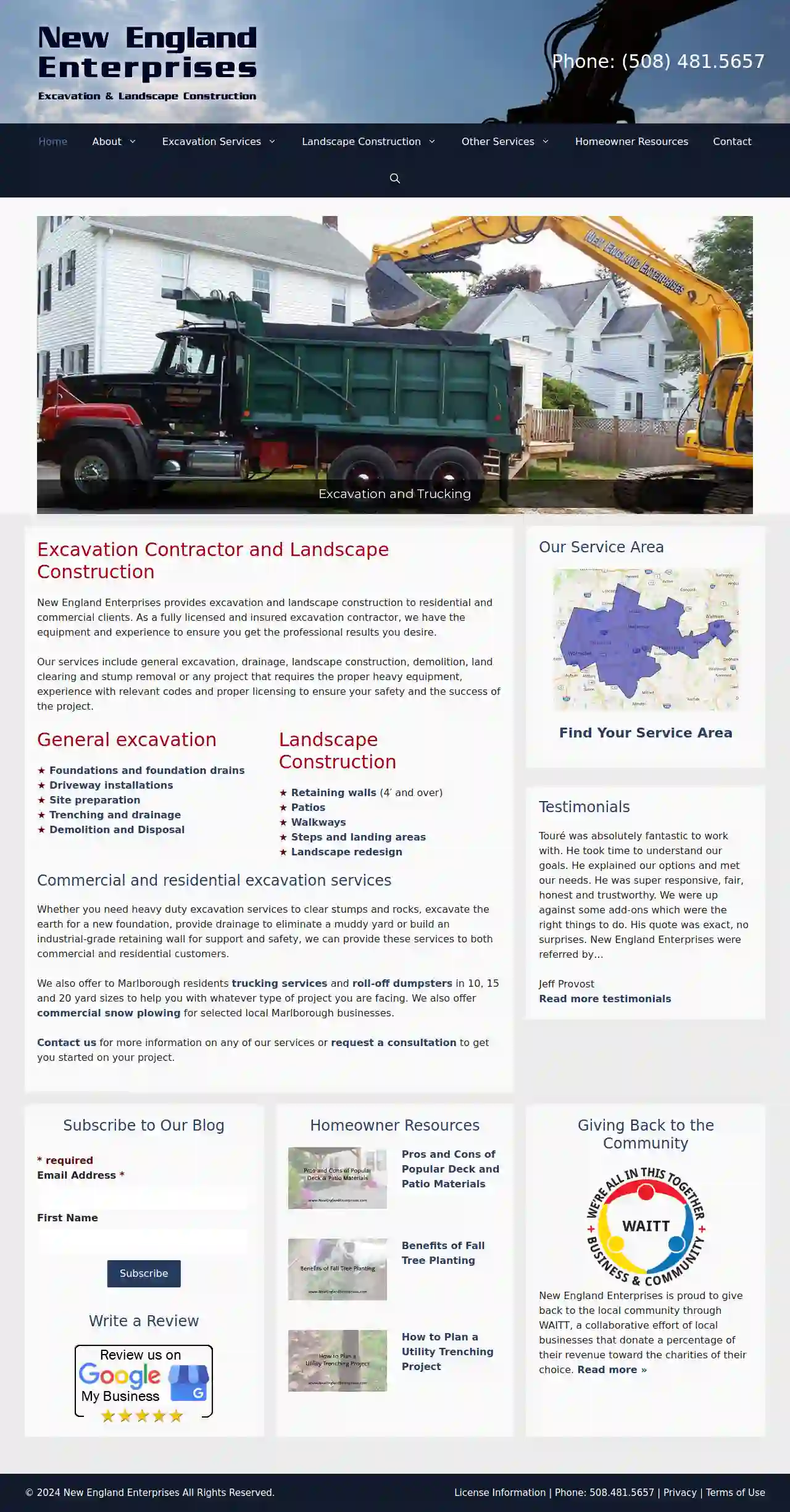
New England Enterprises
510 reviewsPlymouth, USExcavation Contractor and Landscape Construction New England Enterprises provides excavation and landscape construction to residential and commercial clients. As a fully licensed and insured excavation contractor, we have the equipment and experience to ensure you get the professional results you desire. Our services include general excavation, drainage, landscape construction, demolition, land clearing and stump removal or any project that requires the proper heavy equipment, experience with relevant codes and proper licensing to ensure your safety and the success of the project. Whether you need heavy duty excavation services to clear stumps and rocks, excavate the earth for a new foundation, provide drainage to eliminate a muddy yard or build an industrial-grade retaining wall for support and safety, we can provide these services to both commercial and residential customers. We also offer to Marlborough residents trucking services and roll-off dumpsters in 10, 15 and 20 yard sizes to help you with whatever type of project you are facing. We also offer commercial snow plowing for selected local Marlborough businesses. Contact us for more information on any of our services or request a consultation to get you started on your project.
- Services
- Why Us?
- Testimonials
- Gallery
Get Quote
Deloury Construction Co Inc
4.25 reviews100 Burtt Road, Suite G01, Andover, 01810, USTrusted General Contractor and Excavator in Boston, MA The next time you need help with construction, excavation, or demolition services, count on Deloury Industries. Since 1963, our company has been accomplishing the most demanding construction challenges in the state and across our nation, ensuring our commercial and industrial customers meet the ever-changing demands of the marketplace. Why Choose Us? Our company is founded on the values of honest work, community engagement, and continuous improvement. With these values, strong leadership, and the dedication of our highly skilled employees, we've built on our history of success decade after decade. Moreover, we always aim to exceed your expectations in every project facet and bring life to your developments efficiently, safely, and within budget. Hire Us for Your Next Project Let our team make your project the next challenge we overcome. Our reliable, affordable, and trusted company is always ready to handle any of your construction projects. For inquiries about services, contact us and speak with our general contractor. We hope to be of service to you soon! Be Part of Our Team Jumpstart your career with us, and be part of a company that values its workers. Deloury Industries is now hiring truck drivers. To learn more about our career opportunities, get in touch with us.
- Services
- Why Us?
- Gallery
Get Quote
Modern Excavation
41 reviews387 Old Columbia Street, Adams, 01220, USModern Excavation, Inc. Modern Excavation, located in the beautiful Berkshires of Western Massachusetts, services residential as well as commercial customers in all areas of New England. At Modern Excavation you will experience professional work at an honest price, plus ...fast ...friendly ...courteous service. In addition to excavation, we offer many related services throughout the Berkshires, including the southern Berkshire areas of Lenox, Lee, Stockbridge, Becket, Otis, Great Barrington, Sheffield and more. Whether you are a year-round resident of the Berkshires, or a second home owner, we are here to assist you at all levels of service, including excavation, sewer and septic, site work, site & land clearing, waterline replacement, swimming pools, drains, trenching, pool removal, driveways, sand, gravel & top soil, concrete removal, septic system installations and Title V inspections. From simple projects to major repairs, you can count on us for ...Fast ...Friendly ...Courteous Service. Modern Excavation provides a wide range of services to both home owner's and contractors in all areas of New England. We offer Free Estimates and for your convenience we accept MasterCard, VISA and American Express.
- Services
- Why Us?
- Gallery
Get Quote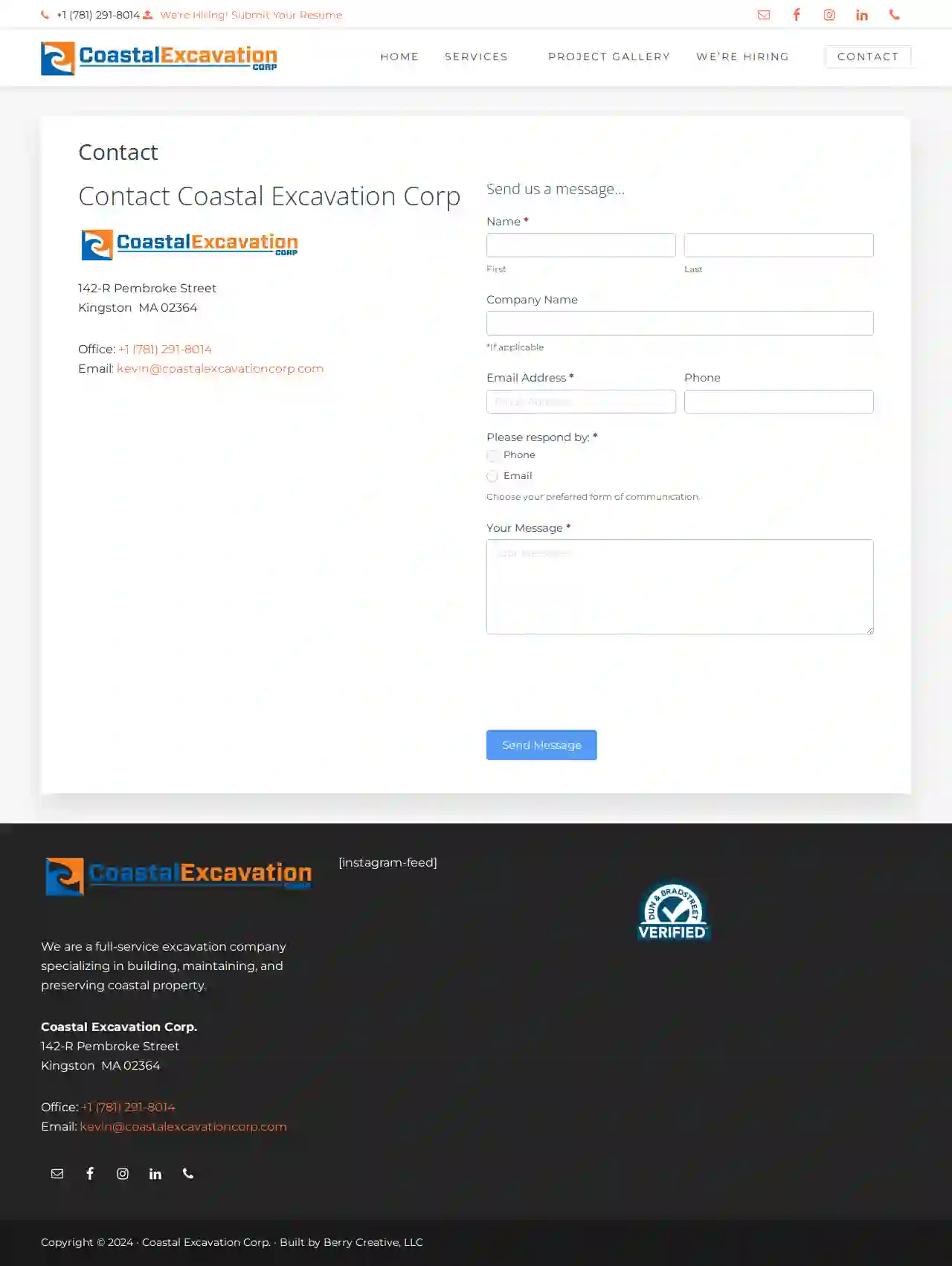
Coastal Excavation Corp
142-R Pembroke Street, Kingston, 02364, USWelcome to Coastal Excavation Corp. Site Development • Landscape Construction • Property Management A full-service excavation company with over 20 years experience working to develop, repair and preserve our precious New England coastline. We face the challenges Mother Nature brings to coastal living What We Do We offer a broad range of coastal management solutions. Based in Duxbury, Massachusetts we serve towns up and down the New England Coastline going wherever our services are needed. Shoreline Construction Landscape Construction Laser Grading Site Development Commercial Property Management Coastal Conservation & Repair There’s Always Something Awesome Going On at Coastal Excavation Corp Our team has a deep respect for Mother Nature and a passion for addressing the challenges she sends our way. Kevin Knippenberg President & Owner Contact Us Today for a Free Consultation We offer a wide range of services. Wondering if we're right for your project? Get in touch and tell us about it. Give Us a Call
- Services
- Why Us?
- Our Team
- Gallery
Get Quote
Amato Excavation
53 reviewsPlymouth, USAbout Amato Excavation Founded in 2021 by Anthony Amato, Amato Excavation was born out of a vision to transform landscapes through precision excavation services. From humble beginnings, we have grown into a reliable and trusted name in the Middlesex Region, with an ever-expanding list of satisfied clients. Our passion for excavating the past and shaping the future drives us to continuously enhance our techniques and equipment, ensuring that we stay at the forefront of the excavation field. Our Mission To provide the highest quality excavation services while maintaining the utmost integrity, safety, and environmental consciousness. We strive to exceed our clients' expectations, no matter the scale or complexity of the project. Our team of skilled professionals is committed to completing each task with precision, efficiency, and attention to detail. What Sets Us Apart: Experience: With years of hands-on experience, our team possesses the knowledge and expertise necessary to handle a wide range of excavation projects with confidence and finesse. Cutting-edge Technology: We invest in state-of-the-art equipment and advanced technology to ensure that our excavation services are efficient, precise, and completed in a timely manner. Safety First: The safety of our clients, employees, and the community is our top priority. We are fully licensed and insured, and adhere to strict safety protocols to maintain a clean, hazard-free work environment. Environmental Responsibility: We are mindful of the impact our work may have on the environment. As stewards of the land, we take measures to minimize disruption and ecological footprint during excavation. Customer-Centric Approach: At Amato Excavation, we believe in open communication and collaboration with our clients. We listen to their needs, offer expert advice, and tailor our services to meet their specific requirements.
- Services
- Why Us?
- Gallery
Get Quote
Orlando Excavation Corp.
54 reviews155 Main Street, Southborough, 01722, USWelcome to Orlando Construction Corp. We take a personal, customized approach with our customers. We are a renown local excavating contractor based in Southborough, MA with over 20 years of experience. Whether it’s a complete site grading, a new septic install, demolition of a large commercial or residential structure, installation of drainage or catch basins, a large retaining wall, a new asphalt parking lot or driveway or a large hardscape project, we take great care and pride in the work we do for you. We are equipped to meet all your project management needs and are committed to delivering the best in quality, service, safety and reliability our clients expect and deserve. The Right Choice… Renown Industry Leader Honest and Trustworthy Service Over 20 Years Experience Free Consultations Fully Licensed, Insured & Bonded We value our customers and are dedicated to serving you See What Our Clients Are Saying… “I am very pleased with the sitework Orlando Construction helped us with on our house lot! Thanks again to Orlando Construction for the great work and for answering all of our questions and concerns along the way. I will definitely be using Orlando Construction again and will recommend them without hesitation!” – Boxborough, MA
- Services
- Why Us?
- Our Team
- Testimonials
- Gallery
Get Quote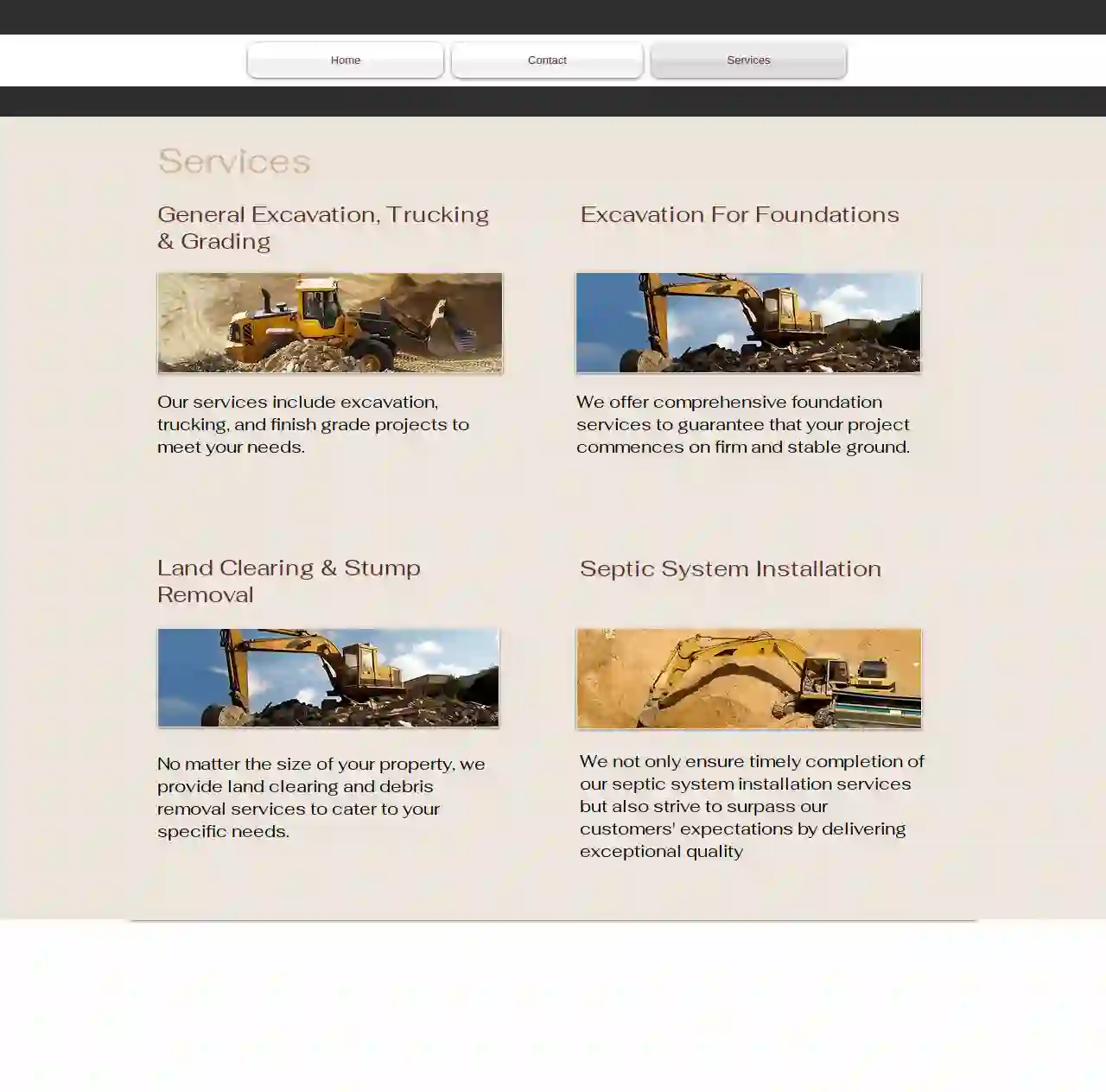
Coastline Excavation Plymouth, Ma
51 reviewsPlymouth, USCoastline Excavation: Your Trusted Partner for Excavation, Trucking, and Grading Coastline Excavation is a reputable company dedicated to providing high-quality excavation, trucking, and grading services to meet your project needs. We understand the importance of a solid foundation for any construction project, and our team of experienced professionals is committed to delivering exceptional results. From initial site preparation to final grading, we handle every aspect of your project with precision and care. Our modern equipment and skilled operators ensure efficient and timely completion, minimizing disruption to your schedule. We take pride in our commitment to customer satisfaction. Our team is dedicated to providing clear communication, competitive pricing, and a personalized approach to every project. We work closely with our clients to understand their specific requirements and ensure their complete satisfaction.
- Services
- Why Us?
- Gallery
Get Quote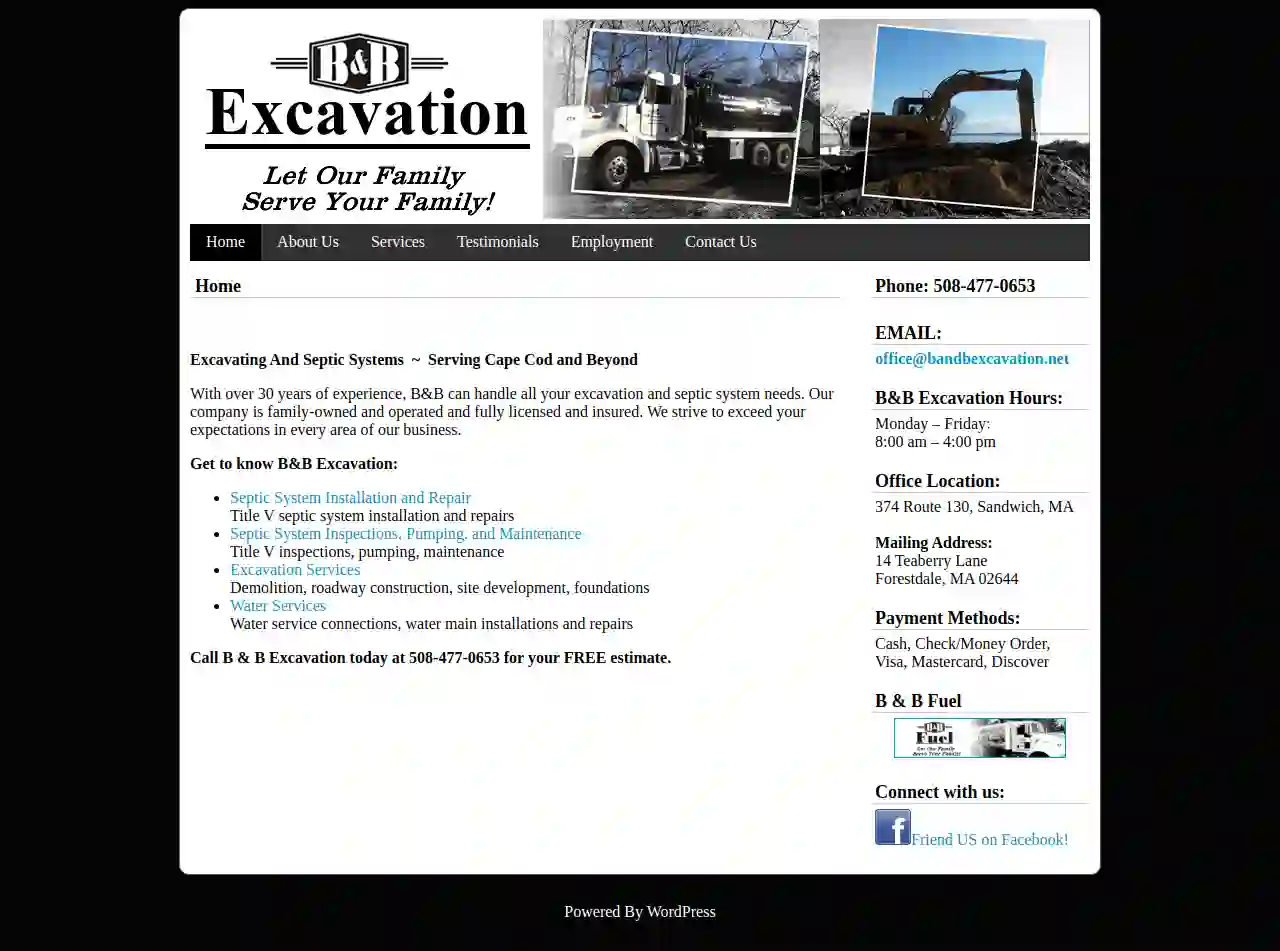
B & B Excavation
4.826 reviews374 Route 130, Sandwich, 02644, USExcavating And Septic Systems ~ Serving Cape Cod and Beyond With over 30 years of experience, B&B can handle all your excavation and septic system needs. Our company is family-owned and operated and fully licensed and insured. We strive to exceed your expectations in every area of our business. Get to know B&B Excavation:
- Services
- Why Us?
- Gallery
Get Quote
Over 22,076+ Excavation Contractors onboarded
Our excavation providers operate in Upton & surroundings!
ExcavationHQ has curated and vetted Top Excavation Contractors in and around Upton. Find a trustworthy pro today.
Frequently Asked Questions About Demolition Contractors
- Experience: Look for companies with a proven track record and years of experience in the demolition industry.
- Licensing and Insurance: Ensure the contractor is properly licensed to operate in your area and carries adequate insurance to protect you from liability.
- Safety Record: Inquire about their safety protocols and accident history. A reputable contractor prioritizes safety.
- References and Reviews: Ask for references from past clients and check online reviews to gauge their reputation and customer satisfaction.
- Professionalism: Choose a company that communicates clearly, provides detailed estimates, and has a courteous and responsive team.
- Implosion: Using explosives to collapse a structure inwards rapidly. Suitable for large buildings in open areas.
- Wrecking Ball: Swinging a large steel ball to impact and break down the structure. Effective for bringing down walls and other solid elements.
- High-Reach Demolition: Utilizing specialized excavators with extended arms and demolition attachments for dismantling tall structures piece by piece.
- Selective Demolition: Removing specific parts of a building while preserving other sections. Often used in renovation projects.
- Deconstruction: Carefully dismantling a building to salvage reusable materials, reducing waste and environmental impact.
- Site Security: Secure the demolition site with fencing and warning signs to prevent unauthorized access.
- Personal Protective Equipment (PPE): Workers should wear appropriate PPE, including hard hats, safety glasses, gloves, and steel-toe boots.
- Hazardous Material Removal: Properly identify and remove asbestos, lead paint, or other hazardous materials before demolition begins.
- Utility Disconnections: Disconnect all utilities, such as electricity, gas, and water, before demolition.
- Controlled Demolition Techniques: Employ controlled demolition methods to minimize risks and ensure the structure comes down safely.
- Dust Control: Implement dust suppression measures, such as water spraying or misting, to reduce airborne particles and protect air quality.
- Emergency Planning: Have an emergency plan in place, including communication protocols and evacuation procedures, in case of unforeseen events.
How do I find a reputable demolition contractor?
What are the different types of demolition?
Can I do demolition myself?
What are the safety precautions for demolition?
How do I find a reputable demolition contractor?
- Experience: Look for companies with a proven track record and years of experience in the demolition industry.
- Licensing and Insurance: Ensure the contractor is properly licensed to operate in your area and carries adequate insurance to protect you from liability.
- Safety Record: Inquire about their safety protocols and accident history. A reputable contractor prioritizes safety.
- References and Reviews: Ask for references from past clients and check online reviews to gauge their reputation and customer satisfaction.
- Professionalism: Choose a company that communicates clearly, provides detailed estimates, and has a courteous and responsive team.
What are the different types of demolition?
- Implosion: Using explosives to collapse a structure inwards rapidly. Suitable for large buildings in open areas.
- Wrecking Ball: Swinging a large steel ball to impact and break down the structure. Effective for bringing down walls and other solid elements.
- High-Reach Demolition: Utilizing specialized excavators with extended arms and demolition attachments for dismantling tall structures piece by piece.
- Selective Demolition: Removing specific parts of a building while preserving other sections. Often used in renovation projects.
- Deconstruction: Carefully dismantling a building to salvage reusable materials, reducing waste and environmental impact.
Can I do demolition myself?
What are the safety precautions for demolition?
- Site Security: Secure the demolition site with fencing and warning signs to prevent unauthorized access.
- Personal Protective Equipment (PPE): Workers should wear appropriate PPE, including hard hats, safety glasses, gloves, and steel-toe boots.
- Hazardous Material Removal: Properly identify and remove asbestos, lead paint, or other hazardous materials before demolition begins.
- Utility Disconnections: Disconnect all utilities, such as electricity, gas, and water, before demolition.
- Controlled Demolition Techniques: Employ controlled demolition methods to minimize risks and ensure the structure comes down safely.
- Dust Control: Implement dust suppression measures, such as water spraying or misting, to reduce airborne particles and protect air quality.
- Emergency Planning: Have an emergency plan in place, including communication protocols and evacuation procedures, in case of unforeseen events.